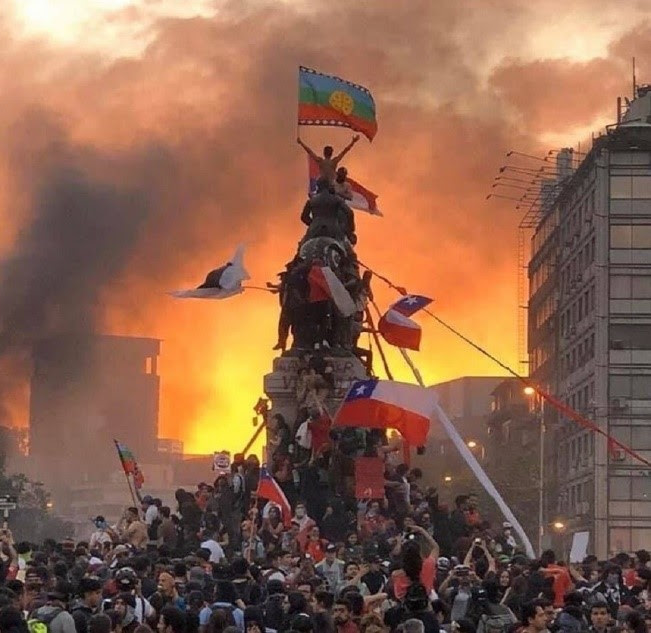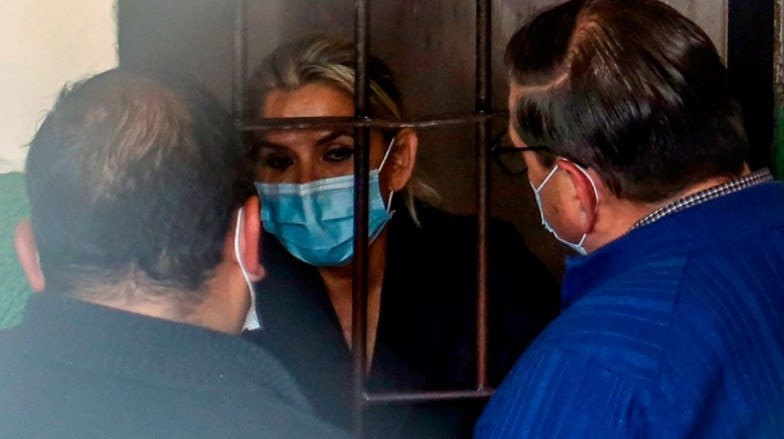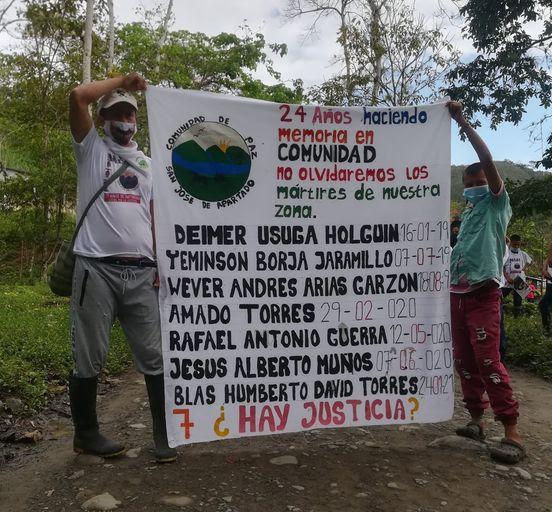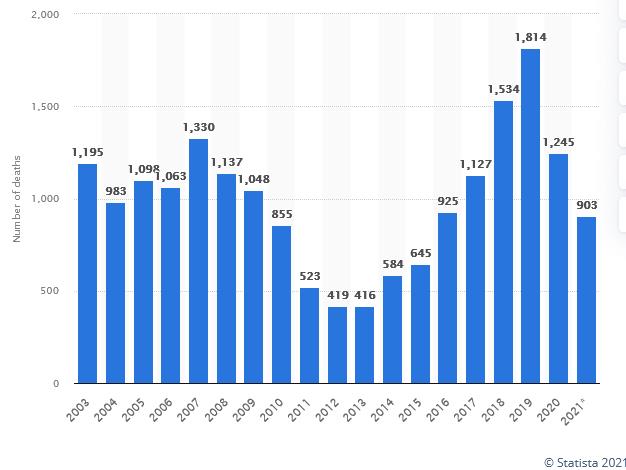This month we bring you updates on human rights issues in Chile, Ecuador, Bolivia, Paraguay, Colombia, Brazil, Venezuela, Chile and Argentina. Actions in relation to the second anniversary of the “Estallido Social” in Chile. The prison situation in Ecuador and the violent riot that occurred. The pressure of the IACHR over Bolivia to know the state of health of the ex-President Áñez. The protests of indigenous groups in Paraguay for the approval of the amendment to the land invasion law, Human rights abuses continue to mount in Venezuela and Colombia. Please sign the Urgent Action on Colombia on behalf of the journalist José Alberto Tejada and the petition on behalf of human rights defenders. The homicides in Rio de Janeiro, Brazil and President Bolsonaro’s speech to the UN. The new report of the UN fact-finding mission on Venezuela.
CHILE
 This month marks the 2nd anniversary of the Estallido. The Estallido are a series of protests that took place in Chile in 2019 and expanded to several cities across the country. On 25 October 2019, over 1.2 million people took to the streets of Santiago to protest against social inequality, demanding President Piñera’s resignation, in what was called as “The biggest march of Chile.
This month marks the 2nd anniversary of the Estallido. The Estallido are a series of protests that took place in Chile in 2019 and expanded to several cities across the country. On 25 October 2019, over 1.2 million people took to the streets of Santiago to protest against social inequality, demanding President Piñera’s resignation, in what was called as “The biggest march of Chile.
The actions of the National Police forces, called Carabineros, resulted in 36 people being killed. Amnesty International published the Eyes on Chile report, where it was proven that police forces were using violence to spread terror. At present, Amnesty International is demanding that the UK Government hold the Carabineros Commander accountable for their actions and to investigate the chain of command.
To mark this anniversary, we will be sending an action by the 13th of October to engage influencers for our campaign marking the 2nd anniversary of the Estallido.
How about expressing your views? Do you enjoy writing? If you wish to write a reflexion or an opinion, get in touch with Carla Torres (carla.torres@amnesty.org.uk) who is setting up a Medium Blog for Amnesty Members to express their views and support our Campaign for Gustavo Gatica, who was permanently blinded by police officers while protesting in 2019.
ECUADOR
116 have been killed and another 80 injured in a riot at one of Ecuador’s largest prisons. The prison has been the scene of bloody fights between gangs for control of the establishment in recent months. President Lasso said that he would send additional security forces and free up funds to avoid a repeat. This was the deadliest act of violence ever reported in Ecuador’s prison system. Human Rights Watch urged the government to fully investigate the violence and bring those responsible to justice. Ecuador’s prisons are notoriously overcrowded.
BOLIVIA

The Inter-American Commission on Human Rights has pressed Bolivian authorities for information on the health of jailed ex-president Jeanine Áñez, who attempted suicide last month. Áñez has been in prison since March, accused of leading a coup in 2019 to oust then-president Evo Morales. According to one of her lawyers, Áñez tried to take her own life a day after prosecutors filed genocide charges against her over the death of demonstrators during protests in 2019. Áñez has denounced the charges as political prosecution.
PARAGUAY
Indigenous groups have demonstrated in Paraguay’s capital against a law that makes it a crime to invade private property. The protest escalated into violence that authorities said saw seven police officers injured, four cars set on fire and other acts of vandalism. The unrest began when the Chamber of Deputies approved an amendment to the land invasion law that would increase the penalty for those who illegally occupy private property from four to six years in prison. Indigenous groups often invade properties to press their demands that land be restored to poor farmers. During the autocratic regime of General Stroessner in 1954-1989, Indigenous people’s lands were taken away and given to people with close links to the government.
COLOMBIA

Amnesty International has updated its petition on behalf of human rights defenders. You can now watch video testimonies from four human rights defenders. Who face the most risk? The defenders who work to defend the land, territory, and environment in rural areas, in Indigenous, campesino (peasant farmer) and Afro-Colombian communities. They find themselves trapped between the violence caused by the armed conflict and disputes over land and natural resources. Please take action!
The Urgent Action on behalf of the journalist José Alberto Tejada continues until 22 October. Since 28 April, he has faced more than 14 security incidents including surveillance and a security forces official threat to kill him. José Alberto Tejada’s work has been crucial in denouncing human rights violations and crimes by the security forces during the Colombian National Strike, in the city of Cali. We urge the National Protection Unit of the Ministry of Interior to provide him with appropriate protection measures with his agreement. Please send copies to the Colombian ambassador Antonio José Ardila, 3 Hans Crescent London SW1X 0LN, elondres@cancilleria.gov.co
Colombia Peace Organisation reports on the increasing violence, attacks and killings on the Colombia-Venezuela border by ELN guerrillas (National Liberation Army), ex-FARC dissidents, two successor paramilitary groups and organised crime. The provincial capital Cúcuta, the Catatumbo enclave and the oil-producing department of Arauca are all the subject of an ongoing civil war which includes members of the army. Armed opposition groups find sanctuary in Venezuela.
Following the National Strike and a peaceful lull, local authorities and protest organizations throughout Colombia report clashes between police and civilians. Violence has irrupted in Bogotá, Medellin, Cali and Bucamaranga. The most serious reports came from the capital Bogotá where youth organizations and the city’s human rights office said that shots were fired after police intervened in nightly protests.
The Inter-American Commission on Human Rights (IACHR) filed the case of Arles Edisson Guzmán Medina regarding Colombia before the Inter-American Court of Human Rights. The case refers to the disappearance of Arles Edisson Guzmán Medina that occurred in Medellín on November 30, 2002. The IACHR found that he was ‘forcibly disappeared by paramilitaries working with the permission of State agents.’ This is an emblematic case linking disappearances to the authorities, with the resulting failure to investigate and prosecute the perpetrators.
BRAZIL

According to Statista, 903 people were killed by the police in the state of Rio de Janeiro in the first seven months of 2021. If this rate of killings continues, 2021 will record the second highest rate of killings by police since 2003. Rio state has the same population as the Netherlands. The vast majority of victims are Black young men.
Amnesty International reports (only in Spanish) on the continued discrimination suffered by the indigenous kukami-kukamiria, who live in the Amazonian rain forest. This community has suffered 58 deaths from Covid-19, the highest proportion of any indigenous community in Brazil.
Amnesty affirms (only in Portuguese) that President Bolsonaro’s speech at the UN does not represent the reality in Brazil. He lauded the protection of the Amazon, the lack of corruption in the country, its advanced laws to protect the environment and his handling of the pandemic. 600,000 Brazilians have died so far from Covid-19, the health system has collapsed, 14.7% of the working population is unemployed, 8,712 square km of the Amazon rain forest has been destroyed so far in 2021 and Brazil’s carbon emissions in 2020 exceeded those of 2015. Please take the Facebook/Instagram and Twitter actions in the attachment.
Amazon Watch reports that female representatives of more than 170 of Brazil’s 300-plus tribes have gathered in Brasília in recent days to oppose highly controversial attempts to strip back indigenous land rights and open their territories to mining operations and agribusiness. Foremost among those threats is the “marco temporal” or “time frame” argument: a legal challenge to indigenous land rights that is being considered by the Supreme Court.
VENEZUELA
New UN Fact-Finding Mission report confirms systemic impunity
Venezuela’s judiciary lacked independence and had allowed serious human rights violations to go unchecked, its report concluded. Public officials have been able to commit crimes with impunity. The Venezuelan government has not yet commented on the report. The team conducted 177 interviews and analysed 183 detentions of people who are, for whom the government perceives to be, opponents. Read the full report here.
Human Rights Agenda for Political Negotiation
The main demands of the representatives of the government of Nicolas Maduro are end repression, overhaul judiciary, free political prisoners and allow Humanitarian Aid. As Human Rights Watch said “Nicolás Maduro’s representatives should commit to taking basic steps to restore respect for human rights and to holding free and fair elections when they sit down at the negotiating table with the Venezuelan opposition”.
UK statement for interactive dialogue with the High Commissioner on Venezuela
UK International Ambassador for Human Rights Rita French gave a statement encouraging Venezuela to give effect to the previous recommendations made by the Fact Finding Mission and to fully cooperate with the Mission. The key points of the statement were the release of the three members of the FundaRedes NGO who are still in detention. The regime’s practice of regularly targeting individuals and organisations engaged in human rights work stands in the way of democracy and a resolution to Venezuela’s humanitarian crisis.
All the best,
South America Team – Richard Crosfield (Colombia and Brazil), Carla Torres (Chile and Argentina), Javier Martinez (Venezuela) and Graham Minter (rest of South America). And please don’t forget that you can follow us on our Facebook page and Twitter.